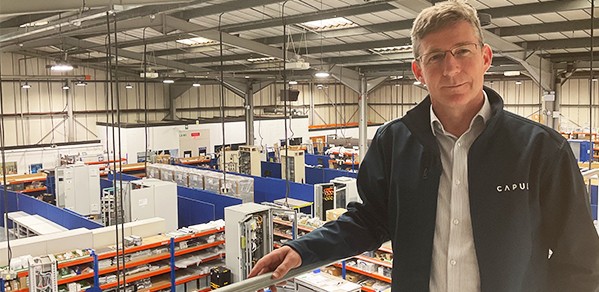
Have you ever taken a Tripos exam in the morning, rowed in the May Bumps in the afternoon and conducted a College concert in the evening? Well, for Engineering alumnus Simon Coombs (Peterhouse), this is certainly the case, and an experience he says demonstrates the breadth of opportunity that Cambridge has to offer – a mix of academia, sport and music.
I loved the practical experiments at Cambridge, working hands-on with lasers, fibre optics, electron microscopes and early power transistors – these were new technologies at the time and very exciting.
Alumnus Simon Coombs
Simon studied the MA Electrical Sciences Tripos at Cambridge from 1983-86. He began his career as a nuclear engineer, before taking up roles in management consultancy and progressing to his current position as Managing Director at Capula – a system integrator with a legacy of performance in automation and digital enablement, owned by Dalkia within the EDF Group.
We caught up with Simon to ask him more about his memories of life and study at Cambridge, and how it helped to light a path for his future career.
The MA Electrical Sciences Tripos at Cambridge was ideal for the start of my career – but very demanding at the time! It was an eclectic mix. We were joined on the course by natural scientists and mathematicians, so our Engineering cohort had to quickly learn quantum mechanics from scratch in eight weeks, whilst the scientists had to catch up on engineering fundamentals and practical activities. I loved the practical experiments. We had the chance to work hands-on with lasers, fibre optics, electron microscopes and early power transistors, which were new technologies at the time and very exciting.
Cambridge helped to lay the groundwork for my first role working on fusion, lasers and other advanced control and power solutions – I was a Systems Engineer at the UK Atomic Energy Authority (UKAEA). The fast pace of study at Cambridge, coupled with the combination of complex maths and engineering systems, as well as a mix of theory and practice, stood me in good stead for technical and functional understanding of data, systems, and processes, that I have used throughout my career.
I remember the Cambridge course taught programming and we learned to write in machine code – moving data between memory addresses. At the time, it was still relatively early days for computing, and this was far removed from the current approach (and convenience) of drag-and-drop programming and configuring modern software. But this detailed knowledge helped develop my interest in real-time data and control systems and has been a key element driving my overall career.
For me, being successful in engineering has come down to two things: what you do and how you do it. I have had the benefit of being able to continue to get “under the bonnet” and the detail of an engineered solution. Nowadays, working in complex environments in critical national infrastructure and helping to achieve net zero, I believe that to be a leader in this field it is important that you understand the context to help engineer even better solutions for clients. But I also recognise the importance of “how” you do this, and that you cannot be successful just on your own. The ability to influence, support and build teams around you is just as important.
Building high performing teams is what defines achievement for me. Success at a business level is about how teams support clients’ objectives. At Capula, part of Dalkia in the UK (a key technical services arm of the EDF Group), we are delivering leading systems integration and digitalisation solutions to energy and infrastructure clients. This means I can bring my broad expertise to this environment, blending my management and consultancy experience with my engineering know-how. Capula’s strategic focus is on supporting the development of the new energy systems and infrastructure that are needed to achieve the ambition of net zero. We are seeing significant growth through supporting the current needs of nuclear, renewables and hydrogen energy systems and also starting to see the exciting future potential of fusion and space-based energy systems.
Cambridge taught me that theory is one thing, but that collaborating and being able to work and lead a team is just as important. If you are starting out on a career in engineering, the best advice I can give is to ensure that you understand the fundamentals and context of engineering as a specialism, then combine this with being a good communicator and collaborator.
The word I would use to describe my Cambridge experience is “varied”. The most extreme example was the day I took a Tripos exam in the morning, rowed in the May Bumps in the afternoon and then in the evening, I conducted our annual College concert. I think what this really demonstrates is the breadth of opportunity that Cambridge gave me – academia, sport and music. I continue to ensure that I have the right balance of these dimensions in everything I do. Even today, I am an engineer by day and a violinist by night!

